Communiqué: Three-Day Capacity Building Training Workshop for Youth Activists in Northern Nigeria on Democracy and Civic Engagement
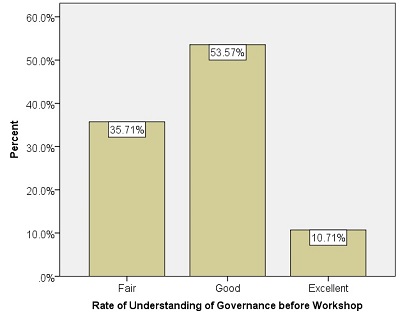
A 3-day Capacity Building Training Workshop for Youth Activists in Northern Nigeria on Democracy and Civic Engagement with funding from the National Endowment for Democracy (NED) was organized by the Organization for CommunitCCEN) on June 13 – 15, 2016 held at K-Suite Hotel, Race Course Road, Kano. A total of 29 participants took part in the workshop. These participants came from diverse groups in the three northern states of Jigawa, Kaduna and Kano, including youth
Preamble
A 3-day Capacity Building Training Workshop for Youth Activists in Northern Nigeria on Democracy and Civic Engagement with funding from the National Endowment for Democracy (NED) was organized by the Organization for Community Civic Engagement (OCCEN) on June 13 – 15, 2016 held at K-Suite Hotel, Race Course Road, Kano. A total of 29 participants took part in the workshop. These participants came from diverse groups in the three northern states of Jigawa, Kaduna and Kano, including youth organizations, student union bodies, civil society groups, media, political class, etc. The conduct of the workshop involved presentations, contributions, questions and answers different themes. Such themes included youth political participation, the concepts of democracy and governance, civic and constituency engagements, universal and fundamental human rights, constitutional democracy, youth restiveness and unemployment, networking and alliance building.
Objective of the Workshop
The main objective of the Training Workshop was to strengthen the capacity of youth to engage with political actors to promote public accountability in Kano, Kaduna, and Jigawa States.
Key Issues from the Presentations
Some of the key issues raised, discussed and internalized by participants during the 3-day training workshop on the various themes were:
1. Democracy involves a process of electing leaders who would form a government of the people with a view to representing the interest of the generality of members of the society.
Democracy is made up such essential elements as recognition of the fundamental worth and dignity of each and every person, respect for the equality of all persons, faith in majority rule and minority rights, necessity of compromise, individual freedom, etc. The two main types of democracy are direct and representative/liberal/constitutional democracy.
2. Governance as a concept simply means the process of decision-making and the process by which decisions are implemented or not implemented. Governance can be used in several contexts such as corporate governance, international governance, national governance and local governance.
Attributes of good governance include accountability, transparency, rule of law, responsiveness, responsibility, equity, inclusive government, effectiveness and efficiency, participatory decision-making, consensus-building, etc.
3. Civic engagement refers to the ways in which citizens participate in the life of a community in order to improve conditions for others or to help shape the community’s future. Literally, the term is used in the context of young people to signify their relevance and contributions to the development of a society.
Civic engagement is important because it is the health of a democratic nation, provides opportunities for youth to volunteer in community and nation-building, develops the capacity of youth to build skills, enables the youth to participate in local decision making and is a platform of mobilization for the youth.
4. Constituency engagement can be achieved through fostering communication between the people and the elected constituent members, updating and informing elected members on the needs of a community, grassroots participation in policy making and empowering communities to determine priority needs and setting the agenda for policy makers.
5. Human rights are the basic rights and freedoms that belong to very person in the world, from birth until death. They are the totality of rights and liberties, immunities and benefits to be enjoyed by human beings.
On December 10, 1948, the UN General Assembly (Resolution 217) adopted fundamental human rights contained in 30 Articles to be universally protected. These rights include: Right to Equality, Right to Life, Liberty, Personal Security, Right to Own Property, Freedom from Discrimination, Right to Equality before the Law, Right to Education, amongst many other rights.
6. A Constitution is a legal document which defines the power structure and the institutional sources corresponding to such power structure. It is a codified legal document that guides members of a country; it specifies the duties, rights and obligations of members of a state.
The functions of a constitution are that it defines the powers of the government, it also defines the basic organs of government and it sets the limits on the use of the powers of government. A constitution can be written or unwritten, rigid or flexible.
7. Youth restiveness and unemployment as problems of the youth in Nigeria have persisted over the years due to the inability or failure of various regimes to give the Nigerian youth the space to make the best use of their talents, energies and abilities through conscious youth-oriented policies. The National Youth Policy that was introduced in 1981 and updated in 2001 and 2007 aimed to promote youth development in totality. However, this vibrant policy has suffered implementation gridlock.
Youth activists can however, alter their situation in Nigeria by intervening in the process in order tothe process in order to be part of the solution through direct participation and community mobilization to influence government policies in favour of youths. The youths should not possibly leave people in government to be on their own, and expect them to work in the interest of young Nigerians.
8. Youth networking and alliance involves working with other partners in pursuit of common goals. We can network and form alliance by talking to people we meet at conferences, workshops and meetings, talking about your group and letting people know what you do, listening to others talk about their group, making presentations to other groups, organizations and agencies. Other ways to network include volunteering to participate in committees and working groups and partnering with other groups to help with their advocacy efforts.
Potential partners and allies include local people who share your concerns with you, other groups working on similar issues, researchers or professionals working in your area of interest and religious organizations. Other likely partners are advocacy groups, social justice and equality-seeking groups, unions, professional and trades groups.
The Communiqué
At the end of the 3-day training, the workshop issued the following as the major observations agreed on during the three-day event:
- That the rule of law in Nigeria’s democracy is inhibited by such factors as weaknesses in the Constitution, certain traditional practices, weak institutions, low public political education, prevalence of corruption, etc.
- There is the problem of human rights abuses in Nigeria as exemplified by extra-judicial execution of Mohammed Yusuf, the Boko Haram leader without fair hearing, removal of fuel subsidy by the Buhari-led government without due consultation with Nigerians, denial of other aspirants to run for presidency in PDP during the 2011 elections when only one ticket was reserved for Goodluck Jonathan and so on.
- That transparency which involves operating in an open, honest, non-secret manner by leaders so that others particularly the followers can see and understand what is going on is lacking in Nigeria’s democracy.
- Similarly, there is little or no accountability among Nigerian leaders because of their overriding selfish interests over public good, corrupt tendencies, poor display of leadership qualities, lack of fear of God and inadequate awareness among Nigeria’s electorate regarding their human rights.
- Freedom of expression connotes the ability to express oneself without hindrance. It also implies the ability to criticize government actions or inactions, hold independent contrary opinion and the right to be heard or given audience.
- That constituency engagement which enhances grassroots participation in policy making and community involvement in governance is absent in Nigeria as a result of lack of civic consciousness, indifference by members of the public to participate in the political process, lack of unity of purpose in the communities and the influence of other factors such as corruption and godfathers on the practice of democracy in Nigeria. Other factors constraining constituency engagement are inadequate capacity to engage, lack of perseverance by the public and the malfunctioning of Nigeria’s democratic institutions.
- In order to network and build alliances, the youth must learn to talk with the right people in society and partner with groups that have common concerns and agenda with them in order to make the needed in-depth impact on the development process.
Workshop Value Quotient: Pre & Post Assessment
In order to ascertain the value of the workshop and its positive impact on the participants, two assessments were made on the level of participants’ understanding of issues discussed before and after the workshop. Below is the outcome of the assessment:
Table 1a: Rate of Understanding of Democracy before Workshop
|
Rate |
Frequency |
Percent |
|
Poor |
2 |
7.1 |
|
Fair |
5 |
17.9 |
|
Good |
16 |
57.1 |
|
Excellent |
5 |
17.9 |
|
Total |
28 |
100.0 |
Table 1b: Rate of Understanding of Democracy after Workshop
|
Rate |
Frequency |
Percent |
|
Good |
9 |
34.6 |
|
Excellent |
17 |
65.4 |
|
Total |
26 |
100.0 |
Figure 1a: Rate of Understanding of Governance before Workshop

Figure 1b: Rate of Understanding of Governance after Workshop
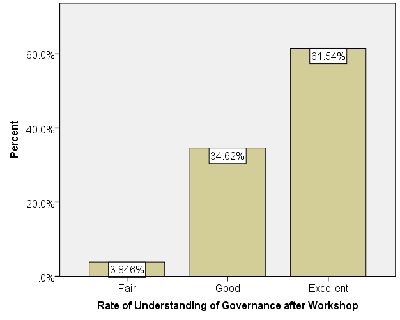
Figure 2a: Level of Knowledge about Leadership before Workshop
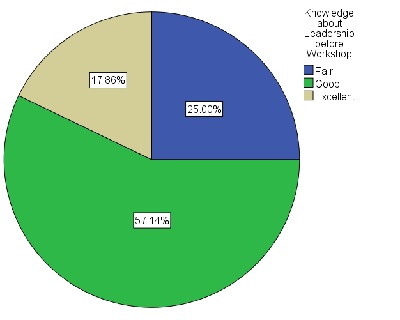
Figure 2b: Level of Knowledge about Leadership after Workshop
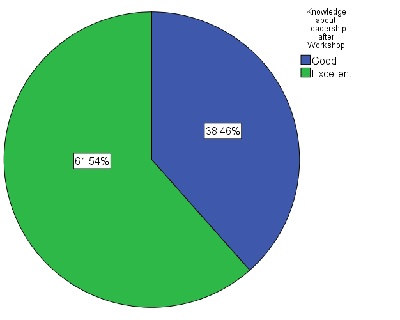
Table 2a: Rate of Understanding Universal Human Rights before Workshop
|
Rate of Understanding Universal Human Rights |
Frequency |
Percent |
|
Fair |
14 |
50.0 |
|
Good |
12 |
42.9 |
|
Excellent |
2 |
7.1 |
|
Total |
28 |
100.0 |
Table 2b: Rate of Understanding Universal Human Rights after Workshop
|
Rate of Understanding Universal Human Rights |
Frequency |
Percent |
|
Fair |
1 |
3.8 |
|
Good |
8 |
30.8 |
|
Excellent |
17 |
65.4 |
|
Total |
26 |
100.0 |
Figure 3a: Knowledge about Nigeria’s Constitution before Workshop
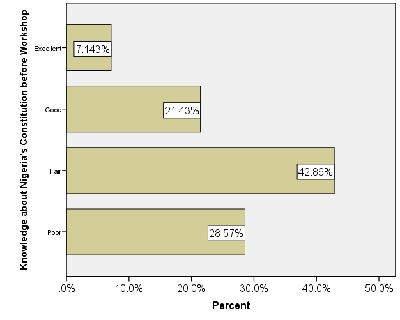
Figure 3b: Knowledge about Nigeria’s Constitution after Workshop
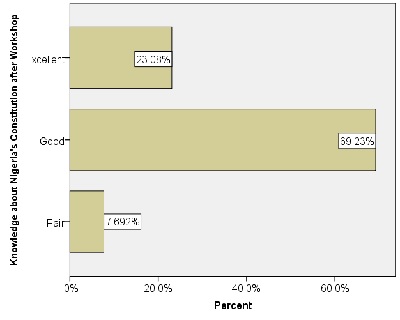
Figure 4a: Level of Understanding Youth Restiveness before Workshop
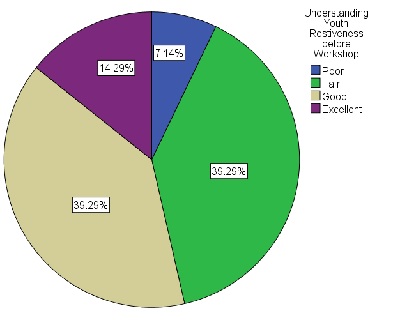
Figure 4b: Level of Understanding Youth Restiveness after Workshop
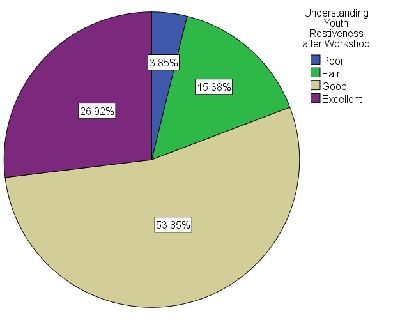
Table 3a: Ability to Network and Build Alliance with Others on Common Issue before Workshop
|
Level of Ability to Network |
Frequency |
Percent |
|
Poor |
2 |
7.1 |
|
Fair |
9 |
32.1 |
|
Good |
10 |
35.7 |
|
Excellent |
7 |
25.0 |
|
Total |
28 |
100.0 |
Table 3b: Ability to Network and Build Alliance with Others on Common Issue before Workshop
|
Level of Ability to Network |
Frequency |
Percent |
|
Fair |
1 |
3.8 |
|
Good |
10 |
38.5 |
|
Excellent |
15 |
57.7 |
|
Total |
26 |
100.0 |
Figure 5a: Knowledge of Bill to Reduce Age Limit of Elected Offices before Workshop
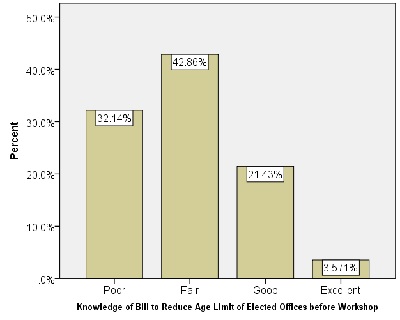
Figure 5b: Knowledge of Bill to Reduce Age Limit of Elected Offices after Workshop
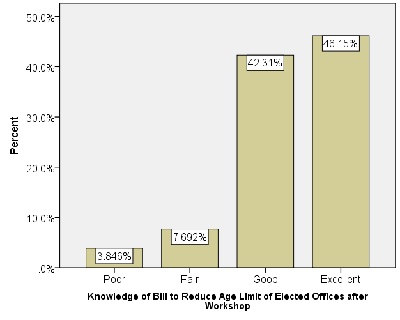
Click here to download PDF Version of this Communique (396 KB)